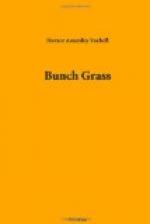For all of us in the foothills except Pap Spooner. By some mysterious instinct he had divined and made preparations for a long drought. Being rich, with land in other counties, he was able to move his stock to green pastures. We knew that he was storing up the money sucked by the sun out of us. He was foreclosing mortgages, buying half-starved horses and steers for a song, selling hay and straw at fabulous prices. And we were reeling upon the ragged edge of bankruptcy! He, the beast of prey, the vulture, was gorging on our carrion.
Men—gaunt, hollow-eyed men—looked at him as if he were an obscene bird, looked at him with ever-increasing hate, with their fingers itching for the trigger of a gun. Pap had his weakness. He liked to babble of his own cuteness; he liked to sit upon a sugar barrel in the village store and talk of savoury viands, so to speak, and sparkling wines in the presence of fellow-citizens who lacked bread and water, particularly water.
One day, in late March, he came into the store as the sun was setting. In such a village as ours, at such a time, the store becomes the club of the community. Misery, who loves company, spent many hours at the store. There was nothing to do on the range.
Upon this particular afternoon we had listened to a new tale of disaster. Till now, although most of us had lost stock, and many had lost land as well, we had regarded health, the rude health of man living the primal life, as an inalienable possession. Our cattle and horses were dying, but we lived. We learned that diphtheria had entered Paradise.
In those early days, before the antitoxin treatment of the disease, diphtheria in Southern California was the deadliest of plagues. It attacked children for the most part, and swept them away in battalions. I have seen whole families exterminated.
And nothing, then as now, prevails against this scourge save prompt and sustained medical treatment. In Paradise we had neither doctor, nor nurse, nor drugs. San Lorenzo, the nearest town, lay twenty-six miles away.
Pap shambled in, clicking his teeth and grinning.
“Nice evenin’,” he observed, taking his seat on his sugar barrel.
“Puffec’ly lovely,” replied the man who had brought the evil news. “Everything,” he stretched out his lean hand,—“everything smilin’ an’ gay—an’ merry as a marriage bell.”




